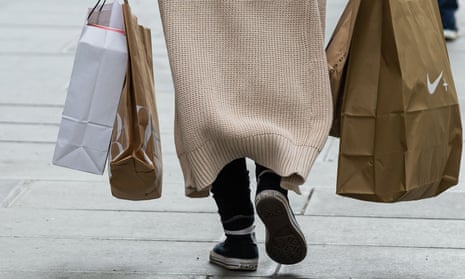Britain’s economy is forecast to grow at the fastest rate since the second world war this year after businesses adapted better to coronavirus restrictions and consumer spending booms as lockdown measures are relaxed.
With businesses and households preparing for looser controls this spring, the EY Item Club said it had upgraded its growth forecasts for 2021 after a stronger start to the year than expected and as rapid progress with the vaccine programme enables a swift return to relative normality.
The group said it now expected GDP to grow by 6.8% in 2021 – a sharp upgrade on the 5% growth rate it had estimated in January – which would mark the fastest annual growth in national income since 1941. The UK economy shrank by 9.8% in 2020, the worst performance in the G7.
It said the improved near-term outlook means the UK economy is expected to attain its pre-pandemic peak by the middle of next year, helped by a boom in consumer spending after a rise in saving by wealthier households during lockdown.
Reflecting expectations of accelerated growth as the economy reopens, consumer confidence increased at the fastest rate in a decade in the first three months of 2021, as the roadmap out of lockdown fuelled optimism.
Every measure of confidence – from the state of the economy, to general wellbeing and personal debt levels – increased over the period, according to the Deloitte Consumer Tracker.
“The UK is primed for a sharp snapback in consumer activity,” said Ian Stewart, the chief economist at Deloitte. “High levels of saving, the successful vaccination rollout and the easing of the lockdown set the stage for a surge in spending over the coming months.”
The government’s decision to extend its furlough support through to the autumn had also boosted sentiment, limiting the rise in unemployment, Stewart said. “The eventual peak in unemployment looks set to be far lower than had been feared, and far lower than following any downturn in the last 30 years.”
The EY Item Club is also predicting that unemployment will peak at lower than previously expected levels, as furlough support continues and companies start hiring again in step with the relaxation of lockdown.
Using the Treasury’s economic models to produce its forecasts, the Item Club said it expected unemployment to reach 5.8% by the end of 2021 – down from the 7% jobless rate it was predicting in January – and as low as 4.5% by the end of 2022. The unemployment rate was 4% before the pandemic struck.
Younger workers have been among those most affected by job losses or reduced employment opportunities during the pandemic. The Item Club said that as the economy recovers, it is vital that businesses step up by providing opportunities to support younger workers back into employment and invest in the skills and training that many have missed out on over the last year.
Howard Archer, chief economic adviser to the Item Club, said the latest forecasts implied a smaller degree of permanent “scarring” for the economy. “The UK economy has proven to be more resilient than seemed possible at the outset of the pandemic. Businesses and consumers have been innovative and flexible in adjusting to Covid-19 restrictions and, while restrictions have caused disruption, lessons learned over the last 12 months have helped minimise the economic impact,” he said.
Deloitte’s Stewart said the main risk to an improving outlook for the UK economy and consumer confidence was the emergence of new, vaccine-resistant variants and a third wave of cases. “With global case rates rising, we are not completely out of the woods,” he said.
